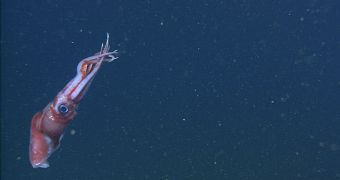A paper published in the July issue of the journal Marine Ecology Progress Series describes a species of deep-water squid, called Octopoteuthis deletron (octopus squid) that can shed parts of their arms in self-defense. This type of tactic has never been observed before.
Whenever the 1-foot (33-centimeter) octopus squid is attacked, it carries out a counterattack during which it puts its arms on the predators. Once its own attack is completed, and the creature pulls away, the tips of the arms are left behind, on the body of the predator.
Researchers believe that this is diversionary defensive tactic, which captures the attention of the original attacker, giving O. deletron sufficient time to make its getaway. The reason why this technique is effective is that the tips of the arms are bioluminescent.
What this means is that they glow in the dark. Since the octopus squid lives at great depths – where little to no sunlight can reach – any source of light is of great interest to most species capable of surviving in this environment.
The new study was carried out by University of Rhode Island postdoctoral researcher Stephanie Bush. “If a predator is trying to attack them, they may dig the hooks on their arms into the predator’s skin. Then the squid jets away and leaves its arm tips stuck to the predator,” she explains.
“The wriggling, bioluminescing arms might give the predator pause enough to allow the squid to get away,” the researcher goes on to say. Bush began her investigation as a graduate research student at the Monterey Bay Aquarium Research Institute's Midwater Ecology Lab.
While at the Lab, she noticed that octopus squid have varied arm lengths, and found that the differences were too significant to be accounted for by natural variability. Bush then hypothesized that the creatures may be able to shed their arms, like lizards can shed their Tails.
The researcher took a remotely operated underwater vehicle off the coasts of California, in the Monterey Bay Submarine Canyon. Using a bottlebrush, she approached an octopus squid, and poked at it with the instrument.
“The very first time we tried it, the squid spread its arms wide and it was lighting up like fireworks. It then came forward and grabbed the bottlebrush and jetted backwards, leaving two arms on the bottlebrush,” Bush says, quoted by Science Blog.
“We think the hooks on its arms latched onto the bristles of the brush, and that was enough for the arms to just pop off,” she concludes, saying that the squid can most likely grow their arms back rather fast.

 14 DAY TRIAL //
14 DAY TRIAL //